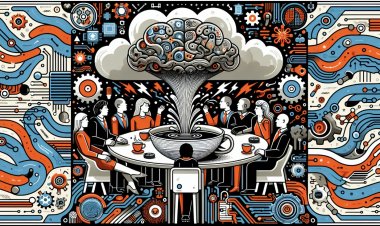The Dark Side of New Age Spirituality: A Critique of the New Thought Movement
Is all that glitters gold in the spiritual world? Unmask the shadows behind the sunshine in New Age spirituality. Explore the New Thought movement's claims, practices, and potential pitfalls with a critical eye.

Introduction
Before we dive into the critique of the New Thought movement, it's important to address a few disclaimers. This blog is not intended to incite harassment or hatred towards the individuals mentioned. Rather, it aims to criticise their business practices and promote ideologies. We cannot determine the true intentions of those mentioned, but it is essential to analyse the harmful effects of their teachings.
This blog will provide sources to support every claim made, but it is crucial to remember that this is the author's opinion and conclusions about new-age spirituality and related ideas. Personal opinion plays a significant role in shaping this critique.
New-age spirituality has gained immense popularity and influence in the mainstream, particularly in the self-help industry. Figures like Napoleon Hill and Ronda Byrne have had a significant impact. However, what often goes unnoticed is the booming business behind it, which can do more harm than good.
It is essential to question the sources and credibility of information surrounding new-age spirituality. Many teachings rely on anecdotal evidence and pseudoscience rather than empirical science-based evidence. This blog aims to shed light on the flawed and dangerous disregard for reality that underlies the new thought movement.
The Booming Business of New Age Spirituality
New-age spirituality has gained immense popularity and influence in the mainstream, particularly in the self-help industry. Figures like Napoleon Hill and Ronda Byrne have had a significant impact. However, what often goes unnoticed is the booming business behind it, which can do more harm than good.
Many people are drawn to the promises of new-age spirituality, hoping to find solutions to their problems and improve their lives. Unfortunately, the financial aspect of this industry can be exploitative, taking advantage of vulnerable individuals who are desperate for change.
People make money in the new-age spirituality industry through various means, such as selling books, hosting workshops and seminars, offering coaching services, and even channelling entities. These individuals often charge exorbitant fees for their products and services, preying on the hopes and dreams of their followers.
The tale of a woman who declined cancer treatment because she believed in the efficacy of the Law of Attraction as presented in Rhonda Byrne's movie "The Secret" is one illustration of the harm that the industry has caused. Tragically, she passed away, highlighting the dangerous consequences of blindly following the teachings of new-age spirituality.
Patterns and themes in the new thought movement include the glorification of positivity, the belief in the Law of Attraction, and the emphasis on personal responsibility for one's circumstances. These ideas can be appealing, but they often lack scientific evidence and can lead individuals to blame themselves for their failures.
It is essential to approach new-age spirituality with a critical mindset and question the credibility of the information being presented. Many teachings rely on anecdotal evidence and pseudoscience rather than empirical science-based evidence. By shedding light on the flawed and dangerous aspects of the new thought movement, we can encourage individuals to make informed decisions about their spiritual beliefs and practices.
The Origins of New Thought
New Thought is a movement that has its roots in the teachings of Phineas Parkhurst Quimby, an American clockmaker who became interested in using the mind to heal people from illness and disease. After allegedly recovering from tuberculosis through his own healing methods, Quimby's teachings became the basis for what would later be known as New Thought.
In the early years, New Thought focused primarily on the mind's ability to heal and relied heavily on anecdotal evidence and intuition rather than empirical science-based evidence. This emphasis on the power of the mind to influence physical health gained popularity and inspired many other authors and philosophers to spread and expand upon Quimby's message.
However, it wasn't until the 20th century that New Thought took a shift towards wealth creation. This shift can be attributed to the influence of Napoleon Hill, an author who gained immense popularity with his books "The Law of Success" and "Think and Grow Rich."
Hill's books promoted the idea that thoughts and desires could be transmuted into financial success. He even claimed that thoughts had the power to cure deafness, including his own son's. While Hill's teachings resonated with many, it is important to note that his reputation is not as pristine as it may seem.
Upon closer examination, it becomes evident that Hill has been involved in various fraudulent activities throughout his life. He co-founded a lumber company that went bankrupt and faced charges of mail fraud. He also established a college and a school, both of which were accused of being scams. Despite these questionable actions, Hill's works continued to be promoted and widely circulated in the new thought and self-help circles.
Today, New Thought continues to thrive and influence the self-help industry. Figures like Napoleon Hill, Ronda Byrne, and Esther Hicks have carried on the teachings of New Thought and attracted a significant following. However, it is crucial to approach these teachings with a critical mindset and question the credibility of the information being presented.
The Controversial Figure of Napoleon Hill
When examining the New Thought movement, it is important to acknowledge the controversial figure of Napoleon Hill. While Hill is often revered for his works on success and personal development, there is a contradictory narrative surrounding him that cannot be ignored.
First and foremost, Hill had a fraudulent past and was involved in failed business ventures. He co-founded a lumber company that went bankrupt, faced charges of mail fraud, and established a college and school that were accused of being scams. These actions raise questions about Hill's credibility and the credibility of his teachings.
Furthermore, Hill's works contain flaws and exaggerated achievements. His books, such as "The Law of Success" and "Think and Grow Rich," promote the idea that thoughts and desires can be transmuted into financial success. While this idea may resonate with many, there is little scientific evidence to support these claims.
It is important to question the credibility and intentions of new thought authors, especially when their teachings rely on anecdotal evidence and pseudoscience. The new thought movement, including figures like Napoleon Hill, often lacks empirical science-based evidence to support their claims.
While Hill's work has had a significant impact on the self-help industry, it is crucial to approach it with a critical mindset. By recognising the fraudulent past, flaws, and exaggerated achievements in Hill's works, we can make informed decisions about the credibility of the information being presented to us.
The Rise of Rhonda Byrne and 'The Secret'
Rhonda Byrne is the creator of the film 'The Secret,' which gained immense popularity and influence in the mainstream. The film promised to change people's lives through the power of the Law of Attraction. It introduced the idea that one's thoughts and desires could be transmuted into financial success, health, and happiness.
'The Secret' became a cultural phenomenon and achieved significant financial success, earning over $65 million in sales. It resonated with many individuals who were seeking solutions to their problems and hoping to improve their lives. However, the film's success also brought about criticism and controversy.
Some critics argue that 'The Secret' is simply a rehashed idea from the new thought movement, a belief system that originated in the teachings of Phineas Parkhurst Quimby. The new thought movement focused on the power of the mind to heal and manifest desires. It emphasised positive thinking, personal responsibility, and the belief in one's divinity.
Opponents of 'The Secret' argue that it lacks scientific evidence and relies heavily on anecdotal evidence and pseudoscience. They claim that the film's promises of instant wealth and success are unrealistic and can lead individuals to blame themselves for their failures.
Despite the criticism, 'The Secret' and Rhonda Byrne's teachings continue to attract a significant following. Many individuals are drawn to the idea that they can change their lives through the power of their thoughts and desires. However, it is essential to approach these teachings with a critical mindset and question the credibility of the information being presented.
Esther Hicks and the Abrahamic Entity
Esther Hicks is a prominent figure in the New Age spirituality movement, claiming to channel an entity called Abraham. She has gained a significant following and has built a lucrative business around her teachings.
However, several problematic aspects of Hicks' teachings need to be addressed. One of the main issues is the victim-blaming that is inherent in her belief system. Hicks suggests that individuals are co-creators of their experiences, including being victims of crimes or illnesses. This victim-blaming mentality can be extremely damaging and can lead to feelings of guilt and shame in those who have experienced trauma.
Furthermore, there is a clear hypocrisy in Hicks' own experiences and beliefs. She claims that thoughts and feelings can cure any disease, yet her own husband, Jerry Hicks, passed away from cancer. This contradiction raises questions about the validity and effectiveness of her teachings.
Another aspect that needs to be examined is the marketing strategy behind the inclusion of spirituality in Hicks' teachings. By presenting her ideas as channelled messages from an entity, she creates a sense of exclusivity and scarcity, making her teachings appear more valuable. This marketing tactic can lead vulnerable individuals to spend large sums of money on her seminars, workshops, and books.
It is important to approach the teachings of Esther Hicks and the Abrahamic entity with a critical mindset. While some individuals may find value in her ideas, it is crucial to question the problematic aspects and consider the credibility of the information being presented. It is always wise to rely on scientific evidence and rational thinking when making decisions about our spiritual beliefs and practices.
Bob Proctor and the Influence of Multi-Level Marketing
Bob Proctor is a prominent figure in the New Age spirituality movement who has been a vocal promoter of multi-level marketing (MLM). MLM is a business model where individuals earn money not only from their own sales but also from the sales of people they recruit into the scheme. Proctor's endorsement of MLM raises questions about his credibility and the value of his teachings.
Proctor's connection to MLM is not surprising, as both MLM and the New Thought movement share similar ideologies. The New Thought movement, which includes beliefs in the Law of Attraction and positive thinking, often attracts individuals who are looking for ways to improve their lives. MLM schemes prey on these vulnerable individuals, promising financial success and personal growth.
However, there are several issues with MLM schemes and their impact on participants. Many MLMs have been accused of being pyramid schemes, where the majority of profits come from recruitment rather than the actual sale of products or services. This can lead to financial losses for the majority of participants, as only a small percentage of people at the top of the pyramid can make a significant income.
Furthermore, MLMs often rely on deceptive marketing tactics and exaggerated promises of success. Participants are encouraged to recruit friends and family members, putting strain on personal relationships and creating a sense of pressure and obligation. The financial and emotional impact of MLMs can be devastating, leaving many people in debt and disillusioned.
Given the controversial nature of MLMs and their negative impact on many individuals, it is important to question Bob Proctor's credibility and the value of his teachings. While he may have achieved financial success through MLM, it is crucial to consider the ethical implications and potential harm caused by these schemes.
It is always wise to approach any business opportunity or spiritual teaching with a critical mindset. Research the company or individual promoting the opportunity, seek out objective information and testimonials, and consider the potential risks and benefits before making any decisions. Your financial well-being and personal growth should never be compromised for the sake of someone else's profit.
The Dark Side of New Age Spirituality
New Age spirituality and the New Thought movement may have gained popularity and influence in the mainstream, but it is essential to understand the dark side of this industry. While there are certainly individuals who genuinely believe in the teachings and aim to help others, there are significant dangers and a lack of accountability within new-age spirituality that must be addressed.
One of the key issues with new thought is the lack of scientific evidence and reliance on anecdotal evidence and pseudoscience. Many of the teachings and claims made by new thought figures are not based on empirical science-based evidence, which can be dangerous when it comes to matters of health and wellbeing.
Another concerning aspect of new-age spirituality is the victim-blaming mentality and the just world fallacy. The belief that individuals are solely responsible for their circumstances can lead to victim-blaming, where those who are suffering are made to feel guilty or responsible for their own misfortune. This can be extremely damaging and dismissive of the complex factors that contribute to an individual's experiences.
New-age spirituality often glorifies positivity and disregards the realities of life. While positive thinking can be beneficial to some extent, the emphasis on constant positivity can create a toxic mindset that invalidates negative emotions and experiences. This can prevent individuals from addressing and resolving their problems healthily and realistically.
It is crucial to encourage critical thinking and scepticism towards the new-age spirituality industry. Many of the figures and teachings within this industry prey on vulnerable individuals who are desperate for change and offer promises that are unrealistic or unattainable. By approaching new-age spirituality with a critical mindset, individuals can make more informed decisions about their beliefs and avoid falling into harmful practices.
Conclusion
In conclusion, it is important to summarise the key points and arguments presented in this critique of the New Thought movement. We have explored the booming business behind New Age spirituality and the potential harm it can cause. The financial aspect of this industry can be exploitative, taking advantage of vulnerable individuals who are desperate for change.
Throughout this critique, we have emphasised the importance of critical thinking. It is essential to question the sources and credibility of information surrounding new-age spirituality. Many teachings rely on anecdotal evidence and pseudoscience rather than empirical science-based evidence.
We have also addressed the potential criticisms and debates surrounding this topic. While some individuals may find value in the teachings of figures like Napoleon Hill, Rhonda Byrne, Esther Hicks, and Bob Proctor, it is crucial to approach their teachings with a critical mindset and question the credibility of the information being presented.
We would like to thank the audience for their support and engagement throughout this critique. It is important to foster a community of informed individuals who can make their own decisions about their spiritual beliefs and practices.
FAQ
Address the common questions and concerns raised in the comments.
Throughout this critique, I understand that there may be questions and concerns raised by the audience. I want to take a moment to address some of the common ones:
-
Q: Are you saying that everyone in the New Thought movement is a scammer?
-
No, I am not saying that everyone in the New Thought movement is a scammer. It is important to remember that individuals have different intentions and beliefs. However, I am highlighting the potential dangers and lack of accountability within the industry.
-
Q: Is positive thinking and manifestation a bad thing?
-
A: Positive thinking and manifestation can have some benefits, but it is important to approach them with a critical mindset. The problem arises when these ideas are taken to extreme levels and promoted as a cure-all for all aspects of life.
-
Q: What about personal responsibility?
-
Personal responsibility can be a positive attribute, but it should not be used as a way to victim-blame or dismiss complex factors that contribute to an individual's circumstances. It is important to consider the broader societal and systemic issues that can impact a person's life.
Provide further explanations or clarifications.
If you have any further questions or need clarification on any of the points discussed in this critique, please feel free to ask in the comments below. I will do my best to provide a detailed response and address any concerns you may have.
Offer additional resources or recommended readings.
If you are interested in learning more about the topics discussed in this critique, I recommend exploring the following resources:
-
"The Sceptic's Guide to the New Age: Understanding the New Age Movement, Reclaiming Your Mind, and Revealing the Truth" by David Christopher Lane
-
"The Science of Self-Help: Empirical Research and Critical Studies of the New Age Movement," edited by Christopher Partridge
-
"The Demon-Haunted World: Science as a Candle in the Dark" by Carl Sagan
These resources offer different perspectives and critical analyses of New Age spirituality and the New Thought movement.
Encourage an open and respectful discussion.
I encourage open and respectful discussion in the comments section. It is important to engage in healthy debates and share different viewpoints. However, please remember to keep the conversation respectful and avoid personal attacks.
We can learn from one another and gain a deeper understanding of these complex topics through respectful and thoughtful dialogue.



 admin
admin 










